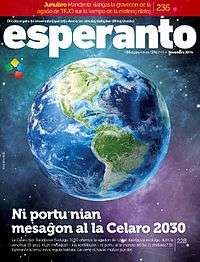
Esperanto
Esperanto (/ˌɛspəˈræntoʊ/ or /-ˈrɑː-/;[espeˈranto] ![]() listen ) is a constructed international auxiliary language. It is the most widely spoken constructed language in the world. Its name derives from Doktoro Esperanto ("Esperanto" translates as "one who hopes"), the pseudonym under which physician L. L. Zamenhof published the first book detailing Esperanto, the Unua Libro, on 26 July 1887. Zamenhof's goal was to create an easy-to-learn, politically neutral language that would transcend nationality and foster peace and international understanding between people with different languages.
listen ) is a constructed international auxiliary language. It is the most widely spoken constructed language in the world. Its name derives from Doktoro Esperanto ("Esperanto" translates as "one who hopes"), the pseudonym under which physician L. L. Zamenhof published the first book detailing Esperanto, the Unua Libro, on 26 July 1887. Zamenhof's goal was to create an easy-to-learn, politically neutral language that would transcend nationality and foster peace and international understanding between people with different languages.
Up to 2,000,000 people worldwide, to varying degrees, speak Esperanto, including perhaps 2,000 native speakers who learned Esperanto from birth. The World Esperanto Association has members in 120 countries. Its usage is highest in Europe, East Asia, and South America.lernu!, the most popular online learning platform for Esperanto, reported 150,000 registered users in 2013, and sees between 150,000 and 200,000 visitors each month. With about 226,000 articles, Esperanto Wikipedia is the 31st-largest Wikipedia as measured by the number of articles, and the largest Wikipedia in a constructed language. On 22 February 2012, Google Translate added Esperanto as its 64th language. On 28 May 2015, the language learning platform Duolingo launched an Esperanto course for English speakers. As of 14 January 2016, over 260,000 users had signed up.

Esperanto (magazine)
“Esperanto” is the main magazine used by the World Esperanto Association to inform their members of virtually everything happening in the world related to the international language Esperanto.
History
The magazine was founded in 1905 by the Frenchman Paul Berthelot. In 1907, the Swiss Hector Hodler became editor-in-chief. The post has been held since January 2014 by the Brazilian Fabrício Valle, successor to Stano Marček.
The magazine was not published during the two World Wars. In-between, Edmond Privat was the director.
Contents
The magazine shows events related to Esperanto, gives interviews of key actors in the Esperanto community, informs about the last published works. There also are opinions, analyses and decisions.
External links
Esperanto (band)
Esperanto was a Belgo-English rock band which had a short career at the beginning of the 70s.
Band members
1st LP: Esperanto Rock Orchestra
2nd LP: Danse Macabre
with contributions from:
3rd LP: Last Tango
Lumen
Lumen can refer to:
See also

Laravel
Laravel is a free, open-source PHP web framework, created by Taylor Otwell and intended for the development of web applications following the model–view–controller (MVC) architectural pattern. Some of the features of Laravel are a modular packaging system with a dedicated dependency manager, different ways for accessing relational databases, utilities that aid in application deployment and maintenance, and its orientation toward syntactic sugar.
As of March 2015, Laravel is regarded as one of the most popular PHP frameworks, together with Symfony2, Nette, CodeIgniter, Yii2 and other frameworks.
The source code of Laravel is hosted on GitHub and licensed under the terms of MIT License.
History
Taylor Otwell created Laravel as an attempt to provide a more advanced alternative to the CodeIgniter framework, which did not provide certain features such as built-in support for user authentication and authorization. Laravel's first beta release was made available on June 9, 2011, followed by the Laravel 1 release later in the same month. Laravel 1 includes built-in support for authentication, localisation, models, views, sessions, routing and other mechanisms, but lacks support for controllers that prevents it from being a true MVC framework.
Lumen (branding agency)
Lumen is a Milan-based multi-disciplined creative and design consulting agency, founded by Pietro Rovatti and Drew Smith in 2003.
History
Lumen was founded in 2003 by the Canadian-born Drew Charles Smith, a consumer branding and packaging specialist, and the Italian Pietro Rovatti, a corporate identity and branding specialist. Previously, Smith had been Creative Director at Carré Noir, Robilant & Associati and, eventually, at FutureBrand Gio Rossi Associati, while Rovatti was Senior Art Director at Sudler&Hennessey and later Creative Director at FutureBrand Giò Rossi Associati.
Corporate structure
Lumen's approach is called branding innovation and, according to its founders, this is what made the agency quickly growing internationally, by opening a branch office in London (UK) in 2006 and establishing strategic partnerships in the same year with Mildberry, the first branding network in Russia, and in 2011 with 1.618, a Hong Kong-based branding agency. As of July 2011, the agency has 50 employees of 18 different nationalities.
Podcasts:

